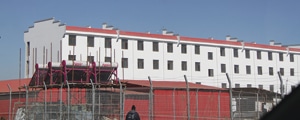
CHINA’S roots have sunk deep in Africa, and nowhere has it found soil more welcoming than in Zimbabwe. Seven years since Zimbabwe declared its “Look East” policy, it’s not clear whether Chinese investment is delivering the returns that Zimbabwe’s leaders are claiming.
President Robert Mugabe’s Maoist economics have beggared a country that 10 years ago was second only to South Africa in economic output in the region. The 88-year-old President has clung to power since the end of minority white rule in 1980, using a combination of force against opponents and relying on the patronage of key supporters.
It was his turning loose of informal militias against white minority farmers, who underpinned the economy in 2000 that signalled a sea of change in the country’s fortunes. By replacing skilled agriculturalists with untrained black farmers, Zimbabwe slid into a lost decade marked by bouts of hunger, mass poverty and an exodus of its professional middle class.
Mugabe’s increasingly acrimonious relationship with the West, especially former colonial power Britain, eventually led to targeted sanctions against him and his inner circle in 2005. It was this that prompted Mugabe to announce a new policy, with his customary eloquence, at a public rally: “We have turned East where the sun rises, and given our backs to the West where the sun sets.”
It’s a relationship that has deepened ever since although it’s not always clear who benefits, and at what cost.
The Zimbabwe government itself is doing everything possible to sell the benefits of Chinese investment to its skeptical population. In the past month alone announcements linking Chinese companies to billion-dollar investments have been made. The Guangdong Bureau of Coal Geology plans to invest $3,5 billion to build a 1 200 megawatt thermal power plant in Zimbabwe, according to media reports.
Another announcement claims China will spend $1,2 billion upgrading water supplies in the south east of the country. In the same week, published reports by State media said China Railway was to build a high speed train between the capital and the industrial city of Bulawayo, 439km to the south-west.
But, apart from this steady stream of announcements from the Zimbabwean government sources, there appears to be little else to give substance to these deals. The high speed rail link, for instance, was announced in The Herald newspaper, but a senior China Railway official, who spoke to Asia Times Online in Harare, said he was unaware of the project until he saw it mentioned in the local media. Instead, he said, speaking on condition of anonymity, China Railway was, like many potential investors in the resource-rich country, waiting for political stability before committing itself to projects.
- Chamisa under fire over US$120K donation
- Mavhunga puts DeMbare into Chibuku quarterfinals
- Pension funds bet on Cabora Bassa oilfields
- Councils defy govt fire tender directive
Keep Reading
“We come, we look, we wait. We want to invest here, but the time is not now. It is not yet stable enough.”
There are suggestions that Zanu PF is punting deals where none exist, as it gears up to go once more to the polls in March next year. Zanu PF has been locked in an uncomfortable unity government with former opposition movements since 2008, following a deal brokered by regional leaders desperate to end the economic fallout of Zimbabwe’s implosion on their countries.
Real power has remained with Mugabe and his inner circle, however. With polls looming, it is quite likely that China is once again being trotted out as Zimbabwe’s rescuer. The United Nations Conference on Trade and World Investment Report 2011 show that Zimbabwe recorded foreign direct investment (FDI) of $105 million, compared to another Southern African country, Angola’s $9 billion for the same period. According to information from China’s Commerce ministry, annual FDI from China to Zimbabwe was between $35 million and $45 million annually between 2008 and 2010.
Chinese companies that have already made active investments are beginning to find that ventures come with a hefty price tag. They are being pushed into financing projects that make little economic sense, in addition they are encouraged to top up Zanu PF’s election war chest.
Among the companies operating in the country are Anjin – involved in a diamond venture with entities linked to Zimbabwe’s military – as well as a company affiliated with Anjin, the Anhui Foreign Economic Construction Company.
Anjin operates in the controversial, but fabulously productive Marange diamond field. The quantity of stones and value of their sale is not disclosed, but British watchdog Global Witness released a report recently that said the Marange diamonds are laundered through a network of tax havens, front companies and nominee shareholders, with very little proceeds finding their way to official tax receipts.
Zimbabwe’s Finance minister Tendai Biti – a member of the the MDC-T which is part of the unity government, but has little actual authority – recently said that Marange operations were producing an estimated $600 million a year in earnings, but that only $30 million had been received in tax contributions.
Anhui recently completed the multi-million dollar Zimbabwe Defence College, which opened last month, and is building a hotel and shopping mall worth over $200 million in Harare, adjacent to the giant National Sports Stadium, also built by the Chinese in the 1980s.
“It is a massive project indeed. I had no idea what size it would be, even what shape it would take, but I was aware that our Chinese friends were building this mall and will build a hotel later,” Mugabe told reporters at the site during a tour of the complex recently.
Given the parlous state of Zimbabwe’s economy, hotels and malls are likely to stand empty for years to come. They do, however, provide Mugabe with much-needed photo opportunities and flagship projects to show off to a battered electorate. – Asia Times Online











